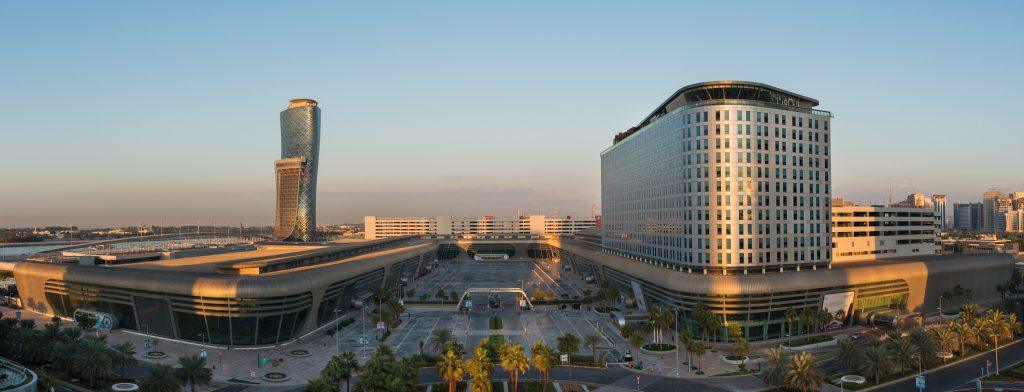Some cities don’t just host change — they direct it. Abu Dhabi Global Healthcare Week 2025 steps into that role as strategy quietly replaces spectacle. Over three days, decision-makers, visionaries, and disruptors move through the same corridors. Planned speeches matter, but unexpected encounters often shift the real agenda. Every idea collides with another; every pause leaves space for a better question.
GLOBAL STRATEGY IS NOT JUST A WORD IN ABU DHABI
In mid-April, as the desert heat shifts and global minds descend on ADNEC’s angular halls, an event begins — not with spectacle, but with intention disguised as conversation. Between April 15 and 17, 2025, Abu Dhabi’s capital becomes something else entirely: a dense, buzzing ecosystem where ministers, hackers, and venture capitalists swap languages without translation. No opening parade, no drumrolls — the tone is quieter, strategic, as if real influence prefers silence.
Abu Dhabi Global Healthcare Week doesn’t fit the standard conference mold. Khaled bin Mohamed bin Zayed’s subtle but deliberate endorsement shapes the energy in every room. Policy people arrive suited and precise, while biotech founders prefer denim and data sets. From corners of Africa to hospitals in Osaka, the crowd reflects global intent without needing a flag. Between genomics and governance, longevity and logistics, the overlaps are neither clean nor accidental. Meanwhile, some wonder if the real outcomes lie not in sessions, but behind elevator doors where future budgets take shape.

INVISIBLE FORCES MOVE THE DIALOGUE FORWARD
There’s no “main theme,” and that’s what makes it magnetic. One hall pulses with AI demos predicting diabetic crises, while next door, a climate health panel speaks of drought and disease in the Sahel. While speakers from GSK and AstraZeneca hold forth on public-private symbiosis, a tech founder from São Paulo scribbles models for scalable primary care in slums. Across from the startup zone, you hear the echo of doubts: not everyone trusts digital health to mean ethical health.
Panels unravel. They’re planned, yes — but the conversations mutate in real time. Moderators often struggle to contain speakers who push past polite consensus. One keynote warns about AI’s promise without process, and another follows it by celebrating exactly that. Healthcare ministers, mostly in tailored gray, speak of resilience with rehearsed calm. But a nurse from Lagos breaks the script and talks about expired drugs, not reform frameworks. The room stiffens, then breathes. Some truths need disruption to echo.
BEHIND EACH PANEL, A DIFFERENT REALITY UNFOLDS
You don’t need a badge to feel the shift. The ADNEC venue, vast and eerily symmetrical, becomes a maze of purposefully disjointed experiences. A machine learning lab from South Korea displays results with 98% predictive accuracy for neonatal complications — across the aisle, someone from Doctors Without Borders quietly questions the ethical bias in those numbers. The design of the space itself encourages collisions: a digital startup collides with a humanitarian fieldworker, and both leave changed.
Michel Demaré, Chair of AstraZeneca, speaks on pharmaceutical diplomacy — minutes later, an African CDC official complicates the idea with field data from refugee camps. Nothing is neatly resolved. Longevity is discussed not just in terms of years added, but years lived meaningfully. Some panels, oddly spiritual, veer toward death and the dignity within it. Others return us to investment — as if capital must have the last word. In between, laughter. It’s not cynical; it’s the sound of contradiction finding rhythm.
DATA DOESN’T CARE WHO FUNDS IT
Beneath the LED gloss and optimized visuals, something messier churns. The Startup Zone flickers with potential: platforms for remote diagnostics, blockchain health records, emotion-detecting interfaces. Not all of them will survive the year, and most founders know this. Yet, hope isn’t always rational. Boston Children’s Hospital hosts a display on personalized pediatrics; a visitor questions the cost. A biotech CEO dodges it gracefully. Numbers float through conversations, but rarely touch ground.
Meanwhile, smaller booths carry heavier weight. A community health platform from Nairobi shows real impact — not projections. Investors nod but don’t take notes. The Live Stage hosts CEOs who talk disruption, but the hallway speakers — unlisted, unpaid, unfiltered — say more in five minutes than some panels in fifty. This isn’t an expo of answers; it’s a marketplace of perspectives, many clashing, few resolving. And somehow, that friction feels like progress.
THE FUTURE WHISPERS THROUGH IMPERFECT STRUCTURES
The final day doesn’t climax. It drifts. You sense that what mattered most wasn’t what was recorded but what wasn’t. A conversation beside the coffee stand between a Gulf health minister and a student coder may become a pilot program by December. A dinner invitation extended after a session on mental health equity could birth an entire regional collaboration. These things don’t get tweeted — they grow in private.


 then "Add to Home Screen"
then "Add to Home Screen"